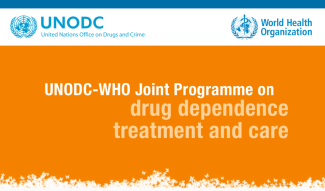UNODC-WHO Joint Programme on Drug Dependence Treatment and Care

Both the WHO and UNODC strive to address the complex issues presented by drug use and dependence.
The vision: The effective and humane treatment for all people with drug use disorders. Nothing less than would be expected for any other disease.
The Joint UNODC-WHO Programme on Drug Dependence Treatment and Care is a collaboration between UNODC and WHO to support the development of comprehensive, integrated health-based approaches to drug policies that can reduce demand for illicit substances, relieve suffering and decrease drug-related harm to individuals, families, communities and societies.
The aims of the joint UNODC-WHO programme:
- Leads a global collaborative effort for improving coverage and quality of treatment and care services for drug use disorders in low- and middle-income countries.
- Promotes the development of comprehensive and integrated treatment systems that are able to deliver a continuum of care for drug users and link services at municipal and national levels.
- Maps population needs, legislative frameworks and available services and programmes for drug dependence treatment and care.
- Supports policy and legislation revision to achieve balance in drug policy and to support humane and effective drug prevention, treatment and care.
- Develops low-cost outreach treatment and care services, and increases access in rural and remote areas.
- Places prevention, treatment and care of drug use disorders into the mainstream health care system, linking with NGOs and ensuring full coordination with the health care system, as part of an integrated continuum of care.
- Provides alternative measures to imprisonment for dependent drug users where appropriate and, where this is not possible, provision of drug dependence treatment in prison settings.
- Supports universities at the national level to promote research and training curricula on drug dependence treatment and care.
- Provides and supports training programmes for professionals involved in the provision of treatment and care for drug users, including those whose professional primary focus is not in that area.
- Develops international recommendations, guidelines and standards aiming at the knowledge transfer from research to practice and supports adaptation and implementation at country level.
- Supports regional networks of quality service providers, working on drug dependence treatment, social support services and HIV/AIDS prevention and care.